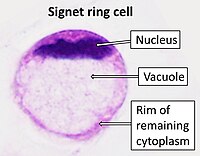
Photo from wikipedia
Background: In the US in 2021, 76,080 kidney cancers are expected and >80% are renal cell carcinomas (RCCs). Along with excess fat, metabolic dysfunction is implicated in RCC etiology. To… Click to show full abstract
Background: In the US in 2021, 76,080 kidney cancers are expected and >80% are renal cell carcinomas (RCCs). Along with excess fat, metabolic dysfunction is implicated in RCC etiology. To identify RCC-associated metabolites, we conducted a 1:1 matched case–control study nested within the Prostate, Lung, Colorectal, and Ovarian (PLCO) Cancer Screening Trial. Methods: We measured 522 serum metabolites in 267 cases/control pairs. Cases were followed for a median 7.1 years from blood draw to diagnosis. Using conditional logistic regression, we computed adjusted odds ratios (ORs) and 95% confidence intervals (CIs) comparing risk between 90th and 10th percentiles of log metabolite intensity, with the significance threshold at a false discovery rate <0.20. Results: Four metabolites were inversely associated with risk of RCC during follow-up—C38:4 PI, C34:0 PC, C14:0 SM, and C16:1 SM (ORs ranging from 0.33–0.44). Two were positively associated with RCC risk—C3-DC-CH3 carnitine and C5 carnitine (ORs = 2.84 and 2.83, respectively). These results were robust when further adjusted for metabolic risk factors (body mass index (BMI), physical activity, diabetes/hypertension history). Metabolites associated with RCC had weak correlations (|r| < 0.2) with risk factors of BMI, physical activity, smoking, alcohol, and diabetes/hypertension history. In mutually adjusted models, three metabolites (C38:4 PI, C14:0 SM, and C3-DC-CH3 carnitine) were independently associated with RCC risk. Conclusions: Serum concentrations of six metabolites were associated with RCC risk, and three of these had independent associations from the mutually adjusted model. These metabolites may point toward new biological pathways of relevance to this malignancy.
Journal Title: Metabolites
Year Published: 2022
Link to full text (if available)
Share on Social Media: Sign Up to like & get
recommendations!